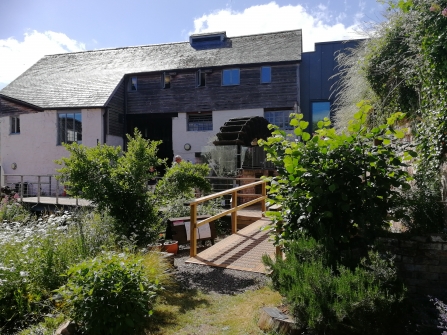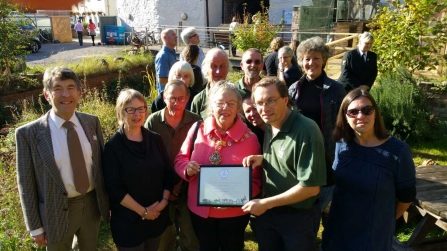
Welcome to the end of year blog by the Devon Wildlife Trust's volunteer Cricklepit Garden Group who look after the RHS award winning garden at the Trust's headquarters at Cricklepit Mill in Exeter.
I think most of us will agree that the weather conditions in Devon this year have certainly been problematic for gardeners and wildlife alike. After surviving the 'Beast from the East' and then facing one of the hottest summers on record, and relatively dry for Devon, our volunteers noticed a worrying lack of bees early on in the year. Thankfully once summer arrived with gusto their numbers soon picked up.
Although some of us may relish the hot dry conditions they aren't ideal for many species and plants. The lack of rain has played havoc with the vegetables (or lack of them) in our Potager Garden and resulted in a rather disappointing annual wildflower bed. We also spent many gardening sessions topping up our wildlife pond and bog garden with water that we had left to stand in our water butts for a week to allow any chemicals to disperse, but on a positive note we have only had to mow the grass twice!
Despite these challenges the Cricklepit Garden Group volunteers have actually made good progress in the garden this year. We have expanded the winter interest border with Sweetbox (Sarcococca Confusa) Dark Purple Bugle (Ajuga reptans Atropurputea) and Ivy Leaved Cyclamen (Cyclamen Hederifolium). It is really starting to fill out now and we plan to add some native daffodils next autumn as a final touch. We have also made some alterations to the orchard by removing the wildflower meadow at the front and planting Betony (Stachys Officinals), Oxlip (Primula Elatior) and Meadow Rue (Thalictrun) under the fruit trees. Next year we hope to add a second wire to the framework to train the upper fruit tree branches along to continue to create an espalier.
Drum roll please......the first stage of our three year woodland glade project has finally got underway with clearance work taking place and planting of Lauristinus (Viburnum Tinus) Sweet Woodruff (Calium Odoratum) and Wood Forget me Not seeds (Myosotis Sylvatica). The beds have been edged with logs from an Ash tree that we had to cut back and we also plan to lay a permeable modular grid system made from recycled plastic along the pathway to make it more accessible.


